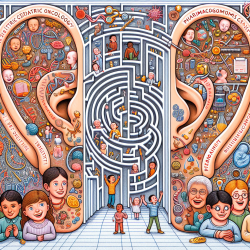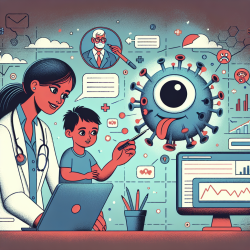Understanding Cisplatin-Induced Hearing Loss in Pediatric Patients
Cisplatin is a cornerstone chemotherapeutic agent used to treat various solid tumors in children. Despite its efficacy, a significant adverse effect is ototoxicity, leading to permanent hearing loss. This complication can severely impact a child's speech and language development, making early identification and intervention crucial.
The Role of Genetic Variants
Recent research has identified specific genetic variants that increase susceptibility to cisplatin-induced hearing loss. The study titled Replication of TPMT and ABCC3 Genetic Variants Highly Associated With Cisplatin-Induced Hearing Loss in Children replicates these findings in a new cohort, reinforcing the role of genetic factors in predicting ototoxicity risk.
Key Genetic Findings
- TPMT Variants: Variants such as rs12201199 showed a strong association with hearing loss, with an odds ratio of 6.1, indicating a significant risk factor.
- ABCC3 Variants: The rs1051640 variant also demonstrated a significant association, further validating its role in ototoxicity risk.
- COMT Variants: Although the association was less pronounced, COMT variants contribute to stratifying patients' risk levels.
Clinical Implications and Predictive Modeling
The study introduces a predictive model combining genetic and clinical factors, significantly enhancing the accuracy of risk prediction. This model includes:
- Genetic markers: TPMT, ABCC3, and COMT variants.
- Clinical factors: Patient age, vincristine treatment, germ-cell tumor, and cranial irradiation.
By integrating these factors, the model achieves a higher predictive accuracy (AUC 0.786) compared to clinical factors alone (AUC 0.708).
Practical Applications for Practitioners
Practitioners can leverage these insights to:
- Identify high-risk patients early, allowing for tailored interventions.
- Consider alternative therapies or protective strategies for those at high risk.
- Advocate for genetic testing as part of the treatment planning process.
Encouraging Further Research
While this study provides a robust framework, further research is needed to refine predictive models and explore additional genetic markers. Practitioners are encouraged to contribute to ongoing research efforts and stay informed about advancements in pharmacogenomics.
To read the original research paper, please follow this link: Replication of TPMT and ABCC3 Genetic Variants Highly Associated With Cisplatin-Induced Hearing Loss in Children.










